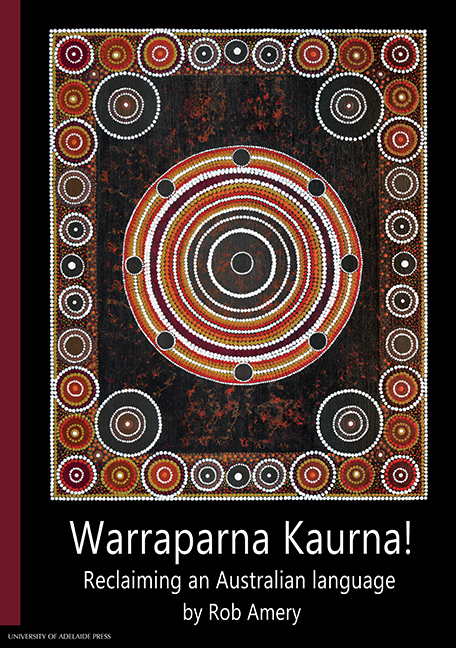Book contents
- Frontmatter
- Contents
- Maps, Plates, Graphs and Tables
- Preface to this Edition (2016)
- Foreword to the 2000 Edition
- Preface to the 2000 Edition
- Acknowledgements
- Abbreviations
- Conventions and Terminology
- Chapter 1 Locating the Study
- Chapter 2 Language Reclamation
- Chapter 3 An Ecological Approach to Language Revival
- Chapter 4 A Sociolinguistic History of Kaurna
- Chapter 5 Kaurna Sources
- Chapter 6 Restoring and Transforming the Kaurna Language
- Chapter 7 Kaurna Language Programs
- Chapter 8 Kaurna in Society
- Chapter 9 Kaurna Language Revival: The Formulaic Method
- Chapter 10 Sociopolitical Dimensions of Kaurna Language Revival
- Chapter 11 Into the Twenty-first Century: Developments since 2000
- Chapter 12 Summary and Conclusions
- Bibliography
- Index
Chapter 3 - An Ecological Approach to Language Revival
Published online by Cambridge University Press: 28 July 2017
- Frontmatter
- Contents
- Maps, Plates, Graphs and Tables
- Preface to this Edition (2016)
- Foreword to the 2000 Edition
- Preface to the 2000 Edition
- Acknowledgements
- Abbreviations
- Conventions and Terminology
- Chapter 1 Locating the Study
- Chapter 2 Language Reclamation
- Chapter 3 An Ecological Approach to Language Revival
- Chapter 4 A Sociolinguistic History of Kaurna
- Chapter 5 Kaurna Sources
- Chapter 6 Restoring and Transforming the Kaurna Language
- Chapter 7 Kaurna Language Programs
- Chapter 8 Kaurna in Society
- Chapter 9 Kaurna Language Revival: The Formulaic Method
- Chapter 10 Sociopolitical Dimensions of Kaurna Language Revival
- Chapter 11 Into the Twenty-first Century: Developments since 2000
- Chapter 12 Summary and Conclusions
- Bibliography
- Index
Summary
With all the problems involved in language maintenance, the most difficult isthat concerned with the control of the passing of a language from parents tochildren as a ‘mother’ tongue … If the chain is once broken, to repair it takes notjust a major effort but … a miracle.
(Spolsky, 1995: 178)To this point we have looked at language in isolation. However, language revival is fundamentally a social process. Our main task in reviving a language 'no longer spoken’ is to reunite the language with its community. An ecological approach lends itself to addressing this task.
Almost all writers view the attainment of ‘intergenerational transmission’ as the main, if not sole criterion for success of language revival efforts. I would argue that more modest goals, such as reintroducing formulaic expressions, public speeches, signage and so on, are important steps along the way. Even if intergenerational transmission is never achieved, programs might be judged highly successful and the progress made might be highly meaningful within the context of the language community. Whilst some like Fishman (1991: 397, 408) might devalue or condemn these lesser goals for diverting attention away from the ‘main game’, in the case of languages ‘no longer spoken’ they could be viewed as remarkable achievements in their own right.
In fact, the lesser goals are the ‘main game’ for a language like Kaurna, at least at this stage. The establishment of formal language programs in schools, using the language in cultural tourism etc. are achievable goals. The reestablishment of ‘intergenerational transmission’ is desired, but everyone realises that this is a more distant, less achievable goal. There are many hurdles to be overcome first, including the need to develop the language to a point whereby it can function in these contexts. Nor would people feel defeated if this ultimate goal were never realised.
Language ecology
The notion of language ecology, a useful and insightful metaphor, is a major theoretical construct underpinning the approach taken to reviving Kaurna. It not only aids in our understanding of the language as it was spoken in the nineteenth century, but also underpins the task of language reclamation in the 1990s. In order to attempt to maintain or revive a language, an understanding of the wider context in which the language exists is helpful.
- Type
- Chapter
- Information
- Warraparna Kaurna!Reclaiming an Australian language, pp. 41 - 55Publisher: The University of Adelaide PressPrint publication year: 2016



